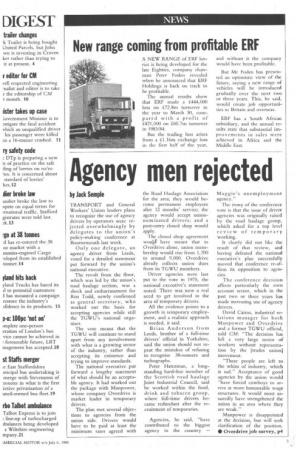Agency men rejected
Page 5

If you've noticed an error in this article please click here to report it so we can fix it.
by Jack Semple
TRANSPORT and General Workers' Union leaders plans to recognise the use of agency drivers by operators were rejected overwhelmingly by delegates to the union's policy-making conference at Bournemouth last week.
Only one delegate, an agency driver from Leeds, voted for a detailed statement put forward by the union's national executive.
The revolt from the floor, which was led by the union's road haulage section, was a shock and embarrassment for Ron Todd, newly confirmed as general secretary, who worked out the basis for accepting agencies while still the TGWU's national organiser.
The vote means that the TGWU will continue to stand apart from any involvement with what is a growing sector • of the industry, rather than accepting its existence and trying to improve standards. The national executive put forward a lengthy statement of what should be an acceptable agency. It had worked out the package with Manpower, whose company Overdrive is market leader in temporary drivers.
. The plan met several.objecflans to agencies from the union side. Drivers would have to be paid at least the minimum rates agreed with the Road Haulage Association for the area; they would become permanent employees after 12 months' service; the agency would accept unionnominated drivers; and a • post-entry closed shop would apply.
The closed shop agreement woutct have meant that in Overdrive alone, union membership would rise from 1,700 to around 9,000. Overdrive already collects union dues from its TGWU members.
Driver agencies were last put to the vote in 1975, the national executive's statement noted. There was now real need to get involved in the area of temporary drivers.
All the evidence points to a growth in temporary employment, and a realistic approach is needed, it said.
Brian Anderson from Leeds, brother of a full-time drivers' official in Yorkshire, said the union should not repeat the mistakes of refusing to recognise 38-tonners and tachographs.
Peter Hatezman, a longstanding hard-line member of the Scottish road haulage Joint Industrial Council, said he worked within the food, drink and tobacco group, where full-time drivers became redundant after the recruitment of temporaries.
Agencies, he said, "have contributed to the biggest agency in the country — Maggie's unemployment agency."
The irony of the conference vote is that the issue of driver agencies was originally raised by the road haulage group, which asked for a top level review of temporary working.
It clearly did not like the result of that review, and having defeated the national executive's plan successfully moved that conference re-affirm its opposition to agencies.
The conference decision affects particularly the own account sector, which in the past two or three years has made increasing use of agency drivers.
David Cairns, industrial relations manager for both Manpower and Overdrive and a former TGWU official, told CM: "The decision has left a very large sector of workers without representation by the [trades unionj movement.
"These people are left to the whim of industry, which is sad." Acceptance of good agencies by the union would "have forced cowboys to arrive at more honourable wage structures. It would most assuredly have strengthened the union in an area where they are weak."
Manpower is disappointed at the decision, but will seek clarification of the position.
• Overdrive job survey, p4




































































































